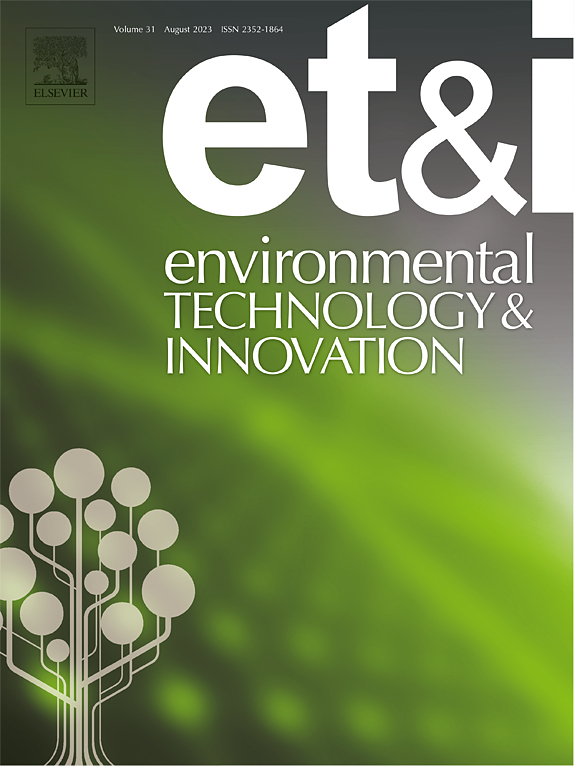优化茶园生产力:镁修饰的茶枝凋落物生物炭改善了土壤质量和茶叶香气
IF 7.1
2区 环境科学与生态学
Q1 BIOTECHNOLOGY & APPLIED MICROBIOLOGY
引用次数: 0
摘要
目的:茶油酸化和缺镁严重限制了茶叶的产量和质量。研究了从茶树修剪废弃物中提取的镁改性生物炭在修复酸性土壤和提高茶树生产性能方面的潜力。方法采用对照(CK)、硫酸镁肥(FC)、茶枝凋落物生物炭(BC)和镁改性茶枝凋落物生物炭(BCY) 4种处理,进行90 d盆栽试验。该研究评估了对土壤化学性质(pH、养分、阳离子)、植物生长参数和茶叶品质指标(包括生化和香气特征)的影响。结果BC和BCY均能显著提高土壤pH值0.27 ~ 0.39个单位(p <; 0.05)。其中,BCY处理效果最显著,提高了土壤有机质(22.93 g kg−1)、速效磷(84 %)、阳离子交换量(76 %)和Mg2+(519 %)水平,降低了Al3+和H+浓度(59 %)。此外,BCY还能提高微生物活性和碳(C)代谢。值得注意的是,BCY处理的茶树表现出更高的高度、生物量,并改善了养分吸收(氮、钾、钠和镁)。相应的,茶的质量也得到了显著改善,茶中多酚、氨基酸、咖啡因和芳香化合物的含量都有所提高。结论茶树剪枝残渣制备的镁改性生物炭能有效改善酸性土壤,缓解缺镁现象,促进茶园微生物活性。这些土壤改良导致更好的植物生长,养分吸收,并最终导致卓越的茶叶品质和产量。这些发现支持了它在茶园管理中作为可持续土壤改良剂的潜力。本文章由计算机程序翻译,如有差异,请以英文原文为准。
Optimizing tea plantation productivity: Magnesium-modified tea pruning litter biochar enhances soil quality and tea aroma profiles
Purpose
Soil acidification and magnesium (Mg) deficiency severely limit tea productivity and quality. This study investigated the potential of Mg-modified biochar, derived from tea pruning waste, to remediate acidic soils and enhance tea plant performance.
Methods
A 90-day pot experiment was conducted with four treatments: control (CK), Mg sulfate fertilizer (FC), tea pruning litter biochar (BC), and Mg-modified tea pruning litter biochar (BCY). The study evaluated the effects on soil chemical properties (pH, nutrients, cations), plant growth parameters, and tea quality indicators, including biochemical and aroma profiles.
Results
Both BC and BCY significantly increased soil pH by 0.27–0.39 units (p < 0.05). Among treatments, BCY showed the most pronounced effects, improving soil organic matter (22.93 g kg−1), available phosphorus (by 84 %), cation exchange capacity (by 76 %), and Mg2+ (by 519 %) levels, while reducing Al3+ and H+ concentrations by 59 %. In addition, BCY enhanced microbial activity and carbon (C) metabolism. Notably, tea plants treated with BCY exhibited greater height, biomass, and improved nutrient uptake (nitrogen, potassium, sodium, and Mg). Correspondingly, tea quality was significantly improved, with elevated levels of polyphenols, amino acids, caffeine, and aromatic compounds.
Conclusions
Mg-modified biochar derived from tea pruning residues effectively ameliorates acidic soils, alleviates Mg deficiency, and stimulates microbial activity in tea plantations. These soil improvements result in better plant growth, nutrient uptake, and ultimately lead to superior tea quality and yield. These findings support its potential as a sustainable soil amendment in tea plantation management.
求助全文
通过发布文献求助,成功后即可免费获取论文全文。
去求助
来源期刊

Environmental Technology & Innovation
Environmental Science-General Environmental Science
CiteScore
14.00
自引率
4.20%
发文量
435
审稿时长
74 days
期刊介绍:
Environmental Technology & Innovation adopts a challenge-oriented approach to solutions by integrating natural sciences to promote a sustainable future. The journal aims to foster the creation and development of innovative products, technologies, and ideas that enhance the environment, with impacts across soil, air, water, and food in rural and urban areas.
As a platform for disseminating scientific evidence for environmental protection and sustainable development, the journal emphasizes fundamental science, methodologies, tools, techniques, and policy considerations. It emphasizes the importance of science and technology in environmental benefits, including smarter, cleaner technologies for environmental protection, more efficient resource processing methods, and the evidence supporting their effectiveness.
 求助内容:
求助内容: 应助结果提醒方式:
应助结果提醒方式:


